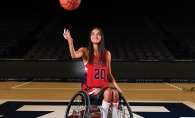V. George “Doc” Nagobads’ living room in Edina is filled with trophies that read, “Hall of Fame,” “Excellence in…,” “In Honor of…” And his recent book, Gold, Silver & Bronze: A Doctor’s Devotion to American Hockey, is filled with the stories that earned him those trophies.
From 1958 to 1992, Nagobads was team physician for the University of Minnesota men’s hockey team. From 1967 to 1990, he also served with the national and Olympic teams, including the 1980 Olympic team that won gold. But before the miracle on ice, and before coming to the U of M, Nagobads was escaping war.
Born in 1921 in Riga, Latvia, in June 1940, he had just graduated from high school, and completed his university entrance exams when the Russians entered the country. “We knew that meant a lot of changes,” he says. His father lost his job as a history professor at a university, and that summer, Nagobads also lost his acceptance to medical school. A year later, while his mother and brother were out of town and his sister was working at a nearby beach, things changed again.
Nagobads and his father had found new jobs. On a night when Nagobads had a basketball game and his father had a meeting, both across town, they decided to stay at a friend’s and a coworker’s, respectively. “That was the night that the Russians deported 14,000 people out of Riga and 44,000 out of Latvia,” Nagobads says. When he returned home the next morning, his neighbor informed him that troops had been banging on their apartment door. “I always say how lucky we are that I had to play basketball and my dad had to be at that meeting,” he says. “Otherwise we would be in Siberia.”
The Russians left Latvia as World War II continued, and Nagobads completed two years of medical school before they returned, when he and his family moved to Germany. There, he completed his education, and learned German (he also speaks French and English, as well as Latvian). Nagobads came to Minnesota, where he completed his surgical residency and found his way to the University of Minnesota, and where he was asked to help take care of the hockey team in 1958. He had played hockey since he was a boy and was thrilled at the thought of getting back into the sport.
Part of what made Nagobads so important was the connections he was able to make while working for both the university and national teams. “I was always in contact with other general managers and doctors, so I could arrange tournaments for our university,” he says. This was especially helpful because many of the nation’s best players were on the U of M team at the time. For example, he says, “In 1971 [U of M] played in Bucharest [Romania]… We had to play the Swiss national team, Austrian national team, Polish national team, and we got second place!”
As Olympic team physician for the 1980 team, Nagobads became extremely close with head coach Herb Brooks, who passed away in 2003. “He was just like my son,” Nagobads says. When the movie Miracle came out in 2004, Nagobads says that, for the most part, it was pretty good. “There are two things that are wrong. One I can live with, one I can’t,” he says. While one of the fights in the movie never actually took place, the part that bothered Nagobads most was the depiction of Brooks as a hard-line coach, forcing his players to hard-skate up and down the rink in Norway. “It was never to real exhaustion,” Nagobads says. “There has never been a coach in all my time as a team physician that has been thinking and caring about his players more than Herb Brooks.”
All his time as a team physician has earned him hundreds of stories to tell at parties, he says. “When I’d tell those stories, someone would say, ‘Geez, Doc! You should write a book about those things,’ ” he says. But with his constant involvement in the International Ice Hockey Federation, there was never time. “So after I was done with that in 2011 was when I really did start.”
The book, a culmination of Nagobads’ fascinating career, is filled with adventure and warm stories about the players and coaches who have relied on him for good hockey and good health.









